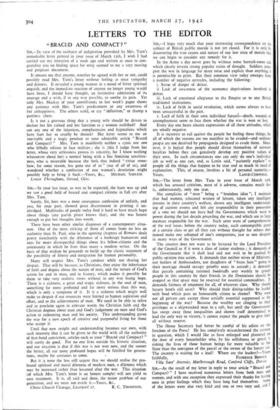Sin,ŌĆöIn your last issue, as was to be expected, the
hunt was up and we saw a good field of braced and compact citizens in full cry after Mrs. Tarn.
Surely, Sir, hers was a most courageous confession of unfaith, and you, for your part, showed great discernment in printing it un- abridged. Multitudes of people today find it hard to have much hope about things (any parish priest knows that), and she was honest enough to put her thoughts into words. ŌĆó There have been other similar diagnoses of a contemporary situa- tion. One of the most striking of them all comes from no less an
authority than St. Paul, who in the opening chapters of Romans deals
pretty trenchantly with the dilemmas of a bankrupt humanism and says far more disrespectful things about his fellow-citizens and the community in which he lives than many a modern writer. On the basis of that realism he proceeds to build up the classic statement of the possibility of liberty and integration for human personality.
Many will respect Mrs. Tarn's candour while not sharing her despair. That will be because, as Christians, they enjoy the inheritance.
of faith and dogma about the nature of man, and the nature of God's action for and in man, and in history, which makes it possible for them to take very realistic views without in any way losing hope.
There is a sickness, a great and tragic sickness, in the soul of man, something far more profound and far more serious than this war, which is only a symptom of it. It is a sickness which might well make us despair if our resources were limited to !Inman aspiration and effort, and to the achievements of man. We need to be able to relive and to proclaim again in relevant words the Christian faith and the Christian dogmas about man and God's judgement on man and God's action in redeeming man and his society. This understanding paves the way for a new epoch of creative and purposeful living for those who accept it.
Until that new insight and understanding becomes our own, with such intensity that it can be given to the world with all the authority of first-hand conviction, articles such as your " Braced and Compact? " will surely do good. For no one lives outside his historic situation, and our situation is that if this war is not won now, and the sooner the better, all our more profound hopes will be falsified for genera- tions, maybe for centuries to come.
But it is none the less still urgent that we should realise the pro- found spiritual and moral dilemma of modern man, a dilemma which may be increased rather than lessened after the war. This situation (of which Mrs. Tarn's letter is an honest sample) will not yield to easy treatment. It is, all said and done, the major problem of our generation, and we must not evade it.ŌĆöYours, &c.,
Christ Church Vicarage, Liverpool 17. R. C. THOMPSON.


























 Previous page
Previous page